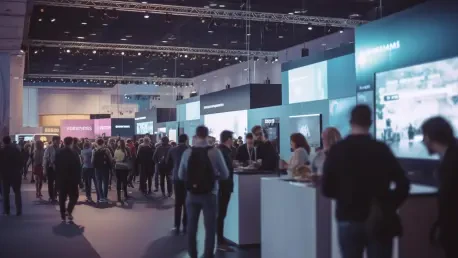Anastasia Braitsik is a globally recognized leader in SEO, content marketing, and data analytics, making her a well-respected voice in the ever-evolving landscape of digital marketing. With a wealth of experience running successful paid media campaigns, Anastasia offers invaluable insights into promoting events effectively through paid search and social ads. This interview dives into how businesses can harness these powerful tools to amplify their event marketing efforts.
What are some examples of business events that can benefit from using paid search and social ads for promotion?
There are myriad business events that can gain significant visibility through paid search and social ads. Some common examples include conferences, be they virtual or in person, and webinars, which are perfect for educational outreach. Product launches and open houses serve as excellent opportunities to create buzz around a brand. Additionally, grand openings, sales events, seasonal promotions, and trade show participations all can attract larger audiences with strategic ad placement. Even more targeted events like local festivals, pet adoption days, and class registrations can see increased engagement through well-crafted advertising strategies.
Why is it important to treat an event campaign as a stand-alone strategy instead of integrating it into existing campaigns?
When you treat an event campaign as a stand-alone strategy, it allows for precise control over critical aspects like budget, targeting, messaging, and conversion tracking. Events have unique goals and often require a focused approach to maximize impact, separate from your typical advertising efforts. This separation not only helps in measuring the event’s effectiveness more accurately but also ensures that the nuances of the event’s goals aren’t lost in broader campaigns.
How can setting up a separate campaign for an event give you more control over its promotion?
By setting up a separate campaign, you have full reins over each element that can drive event success. This means you can tailor your budget to reflect the urgency and importance of the event, finesse targeting to reach the most relevant audience, and craft messaging that speaks directly to the event’s unique selling points. Additionally, it simplifies tracking performance specific to the campaign, enabling you to assess return on investment more clearly.
What are the advantages of having a distinct budget for event campaigns?
Allocating a distinct budget for event campaigns safeguards your primary campaigns from losing pace, ensuring that your business-as-usual operations remain unaffected. This focused spending enables you to emphasize urgency with high-intent audiences, which is crucial for time-sensitive events. When managed well, even a modest budget can generate substantial returns and significantly boost overall event participation.
How should event details be incorporated into ad copy to ensure clarity and engagement?
Clarity is key in event ad copy. Essential details such as the event’s name, date and time, and location or virtual link should headline the advertisement. It’s also effective to include calls to action like “Register”, “Sign Up”, or “Save Your Seat.” Pinning features in platforms like Google Ads can be utilized to ensure critical information stays prominent, thus preventing any miscommunication.
What are some tips for designing high-performing event campaigns?
A central tip is to ensure that the ad copy is straightforward, cutting through any ambiguity. Key information must be immediate and unmistakable. Countdown timers can inject a sense of urgency, prompting quicker audience action, while clear mentions of discounts or early-bird pricing in headlines can dramatically improve engagement rates.
How can being strategic about the timing of event promotions impact their success?
Timing is crucial in event promotions. By dividing the campaign into phases—pre-event hype, during the event, and post-event follow-ups—you can maintain momentum and adapt strategies as required. Awareness of platform-specific scheduling, such as Google Ads’ cutoff times, ensures that campaigns run precisely as planned, optimizing reach and engagement.
How does location targeting vary depending on the event’s scale, and what should advertisers consider while setting it?
The scale of the event significantly dictates location targeting. Local events may benefit from radius or city-level targeting, while regional efforts might layer metro areas or ZIP codes that promise high interest. For national or online events, historical engagement patterns and ROI can guide enhanced targeting. The key is to match the targeted area with the anticipated audience scale to maximize resource efficiency.
Why might an existing keyword list or audience segment not be suitable for an event, and how should targeting be adjusted?
Existing keyword lists or audience segments may not always align with the specialized nature of an event. Instead, targeting should reflect specific event names, branded keywords, and topical interests related directly to the event. Leveraging platform-specific customer lists can enhance reach and relevance, ensuring that the audience reached is intent-driven and likely to engage.
How can businesses benefit from events they are not directly participating in?
Businesses can harness the thematic relevance of external events to drive related traffic to their offerings. For instance, a florist could run targeted ads during a local wedding expo, capitalizing on the influx of potential customers seeking event services. This strategy expands brand visibility beyond conventional boundaries and taps into an already-engaged audience.
What are the final thoughts on the importance of dedicating careful strategy and planning to event campaigns?
Meticulous strategy and planning are vital for noteworthy results in event advertising. Such campaigns offer not only a chance to drive attendance and participation but also to solidify brand presence and differentiate from competitors. By dedicating effort and resources to these campaigns, businesses can leverage events to build brand strength and extend market reach effectively.
Do you have any advice for our readers?
Remember, event advertising should be dynamic and adaptable. Stay informed of the latest tools and trends, and be prepared to adjust your strategies as you learn what works best for your audience. Embrace creativity, and don’t shy away from experimenting with new approaches that could offer surprising and valuable insights.









